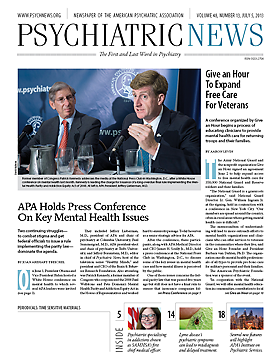Roger McIntyre, M.D., looked around the room at APA’s annual meeting in San Francisco in May and asked the attendees which was more difficult: treating mania in bipolar patients or treating those presenting with depression.
Few listeners responded to the first question, but nearly every hand in the room shot into the air after the second.
“Depressive symptoms and depressive episodes are not only the index presentations of bipolar disorder but are also the predominant symptoms at presentation,” said McIntyre, a professor of psychiatry and pharmacology at the University of Toronto. “It is abundantly clear at this time that the lion’s share of morbidity with bipolar disorder is a consequence of the depressive phase, but most treatments are not very effective” at treating this.
Yet clinicians faced an “anemic” list of options, he said. All seven of the atypical antipsychotic agents approved for bipolar disorder are antimanic, but only three are antidepressant, he said.
Even these medications have problems, however. Olanzapine monotherapy produces only a modest effect size in bipolar I depression, but the weight gain it induces is a “deal breaker” in McIntyre’s view. Quetiapine shows separation from placebo in bipolar I and bipolar II patients but also causes weight gain. Lurasidone works as an adjunct to lithium or valproate in acute bipolar I depression but is not approved as monotherapy.
Gaining weight is not just a cosmetic problem, it’s a “brain hazard,” said McIntyre. The literature indicates that metabolic obesity affects the neural system and the circuits serving affective processing and cognition. That has important downstream consequences.
“Obesity in bipolar patients reduces the likelihood that the patient will recover from a manic episode and the likelihood that they will stay well over the long term, and it increases the risk of depression,” he said.
McIntyre’s studies using diffusion tensor imaging revealed that overweight patients with first-episode bipolar disorder had a decreased signal in the default mode network, with a pattern equivalent to that of normal-weight patients after four or five episodes.
“Weight gain from medication is not only unwanted, it may also be changing the underlying brain structure and function,” he pointed out.
With regard to the maintenance phase of treating bipolar disorder, conventional antipsychotics are efficacious in acute mania, but not in acute bipolar depression, said McIntyre. He cited a recent small study comparing patients taking lithium or valproate plus perphenazine with those taking lithium or valproate plus placebo. Patients in the perphenazine arm had a greater chance of dropping out and adverse events, including extrapyramidal side effects.
They also had a “clinical toxicity of depression.” The literature is not clear about whether using an antipsychotic causes depression, but it does “induce a phenotype that is indistinguishable from depression—dysphoric, fatigued, with psychomotor retardation,” he said.
“In short, we don’t have evidence that conventional antipsychotic medications can treat, delay, or prevent depression,” he said. However, there is some evidence that olanzapine may forestall the return of clinically significant depressive symptoms in bipolar patients who had achieved remittance with the drug in the short term.
Quetiapine as an adjunct to lithium or valproate in patients followed for one to two years shows an advantage compared with placebo in delaying and reducing recurrence in bipolar depression. That utility is offset, however, by acceptability issues and weight gain.
Finally, DSM-5 has introduced the “mixed specifier,” the appearance of syndromal mania or depression with some manifestation of opposite symptoms. This is not uncommon, said McIntyre. Patients are typically overactive, impulsive, and agitated and have racing thoughts.
Using manufacturers’ datasets from clinical trials, McIntyre found that 35 percent to 40 percent of manic patients qualified for the mixed specifier by DSM-5 standards. The drugs again generally worked to treat mania, but only lurasidone was efficacious both for bipolar depression and also for bipolar depressive patients with the mixed specifier that included subsyndromal hypomanic features.
Overall, efficacy is critical in selecting a medication but clinicians remain “significantly limited by issues of central system side effects as well as by metabolic side effects,” he said. ■

